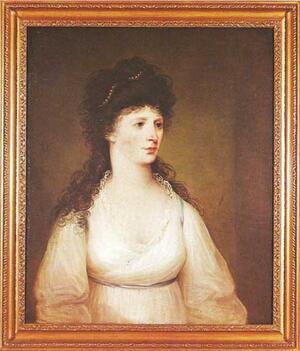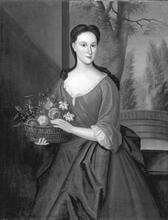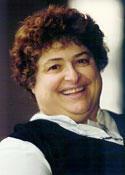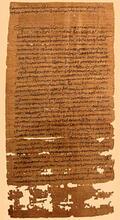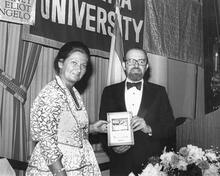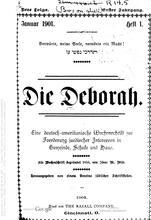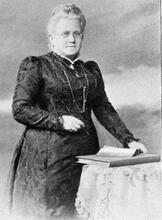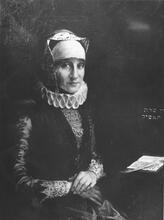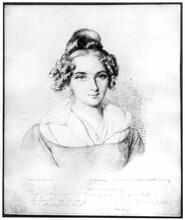Rebecca Franks
Portrait of Rebecca Franks, British Loyalist.
Courtesy of the Naomi Wood Collection at Woodford Mansion
A British Loyalist in the American Revolution, Rebecca Franks was known in high society for her sparkling wit. Raised in a secular household, she welcomed British officers during their occupation of the city and was courted by a British officer, Henry Johnson. As both he and Franks’ father remained loyal to the crown, they were forced to depart for England in 1780. The couple married in 1782, and Johnson was later elevated to a baronetcy for his military service during an uprising in Ireland. Despite her loyalty to England, Lady Rebecca Johnson mused intriguingly in later life, “I have gloried in my rebel countrymen … Would to God I, too, had been a patriot.”
This admired, beautiful, vivacious, intelligent member of the affluent and influential Franks family is a noted figure in Jewish colonial history. She is remembered as one of the young women who warmly greeted British officers of General William Howe’s army during their occupation of Philadelphia in 1776. Probably few of these officers realized that her father, David Franks, was Jewish, though married to Margaret Evans, a member of an established Philadelphia Quaker family, or that her grandfather, Jacob Franks, was a prominent merchant who had been parnas [president] of New York’s Congregation Shearith Israel.
Family and Education
Rebecca Franks was born in 1760 in Philadelphia and raised as a Christian, as was her elder sister, Abigail, named after her father’s mother. Abigail married Andrew Hamilton, an attorney general and acting governor of Pennsylvania. Her aunt was Phila Franks, wife of General Oliver deLancey, a Loyalist and representative of New York’s Anglican aristocracy.
Perhaps due to the openness of colonial society, Rebecca Franks’s Jewish background seemingly mattered little to those who knew her. In 1775, Major John André painted a portrait of her in miniature accompanied by lines of poetry. On May 14, 1778, just before the British departed, Philadelphia’s grand ball, “the Meschianza,” was held, full of color and pageantry. There, in all her radiance, was Miss Rebecca Franks, one of the “Queens of Beauty,” in her polonaise dress of white silk lace, her hair adorned with shimmering jewels. It was a scene indelibly etched in the city’s history.
Society, manners, and dress were always of great interest to her. On a visit with her father to New York, then also under British rule, she compared the virtues of New York women to those of her own city. The former has more of a “sweet countenance and an agreeable smile,” but were duller, if not more stupid, and too eager to throw themselves at men, she wrote in a letter dated August 10, 1781, from Flatbush, Long Island. Her own education was informal; there were few public schools, and she likely had a private tutor.
The Revolutionary War
Franks’s father was a member of the Pennsylvania Assembly in 1748, and a commissary agent for the British army before and during the Revolution and for Congress during the war. Apparently, he remained loyal to the British cause and found himself accused of aiding the British. Eventually, in 1780, he was ordered out of the state. Rebecca seemed little affected by these events. Though she might have written a Loyalist poem, she was also a good friend of American General Charles Lee, who subtly at times reminded her of her Jewishness.
Attention was paid to Franks by another English officer, and on January 17, 1782, she married a noted lieutenant colonel who later became General Sir Henry Johnson. He had been in the command of the British garrison at Stony Point, New York, but was forced to surrender the post in 1779. The couple soon left for England. Her father followed at almost the same time. A number of years later, Lady Rebecca Johnson recalled what might have been, “I have gloried in my rebel countrymen … Would to God I, too, had been a patriot.” She said nothing about her Jewish heritage.
Later Life and Descendants
In fact, by the end of the eighteenth century, the Franks family ceased any such connection. One reason might be found in the skepticism of institutional religion expressed by her grandmother, Abigail Franks, a daughter of the Enlightenment, who found organized religions, especially Judaism and Catholicism, in great need of reform. Her secularism probably influenced her son David, her other children, and possibly grandchildren. Of David Frank’s five children, four married non-Jews and one did not marry. Two of his children were baptized. Rebecca Franks, though not baptized, was surely more at home in the non-Jewish world than that of her grandfather.
Franks died on February 13, 1823, in Bath, England. Her husband, Sir Henry, died in 1835. They had two children, Sir Henry Allen Johnson and George Pigot Johnson. Henry Allen married Charlotte Philipse, a member of the prominent New York family. They had thirteen children. Five became generals, two were colonels, and one a captain—all in the British army.
BDEAJ.
Friedman, Lee M. Jewish Pioneers and Patriots (1943).
Griswold, Rufus W. The Republican Court (1856).
Hershkowitz, Leo, and Isidore S. Meyer, eds. The Letters of the Franks Family, 1733–1748 (1968).
JE.
Johnson, Henry P. The Storming of Stony Point, July 15, 1779 (1900).
Marcus, Jacob R. The Colonial American Jew, 1492–1776 (1970).
NAW.
PAJHS 11:184–186.
Stern, Malcolm H. Americans of Jewish Descent (1960).
UJE.
Wolfe, Edwin, and Maxwell Whiteman. The History of the Jews of Philadelphia from Colonial Times to the Age of Jackson (1957).

